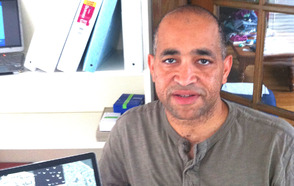NIH Awards $287,000 to Research Project Led by Prof. Pascal Lafontant

September 18, 2015
Pascal J. Lafontant, associate professor of biology at DePauw University, is the recipient of a National Institutes of Health (NIH), Academic Research Enhancement Award (AREA). The $287,083 grant will support the project, "Endocardial Contribution to the Vascularization of the Zebrafish Heart During Development and Regeneration," for three years.
Dr. Lafontant's project "focuses on the development of coronary vasculature of the zebrafish, an important biomedical model less frequently used in an undergraduate setting, and in the development of coronary vasculature," according to the professor. "In particular this study aims to investigate the contribution of the endocardium in the developing coronary plexus, and its potential implication for cardiac regeneration. This project uses an underutilized experimental model system in coronary development studies, will provide opportunities and sponsorship for undergraduate students to engage in meritorious research at an undergraduate institution, and will enhance the undergraduate developmental biology research environment."
Over the years, Lafontant has collaborated in his laboratory with undergraduate students who intend to pursue graduate degrees in biomedical sciences, and the NIH project will also enlist the assistance of DePauw students, and "will contribute to an important area of developmental biomedical science," notes his grant proposal. "Funding of this proposal will also strengthen research infrastructure at DePauw University and enhance the opportunities for continued undergraduate student interest in biomedical research," he wrote.
important area of developmental biomedical science," notes his grant proposal. "Funding of this proposal will also strengthen research infrastructure at DePauw University and enhance the opportunities for continued undergraduate student interest in biomedical research," he wrote.
Research reported in this publication was supported by the Eunice Kennedy Shriver National Institute of Child Health & Human Development of the National Institutes of Health under Award Number R15HD084262. The content is solely the responsibility of the authors and does not necessarily represent the official views of the National Institutes of Health.
Visit the NIH online.
Learn more about Professor Lafontant's research in this previous story or a 2012 feature article.
Back